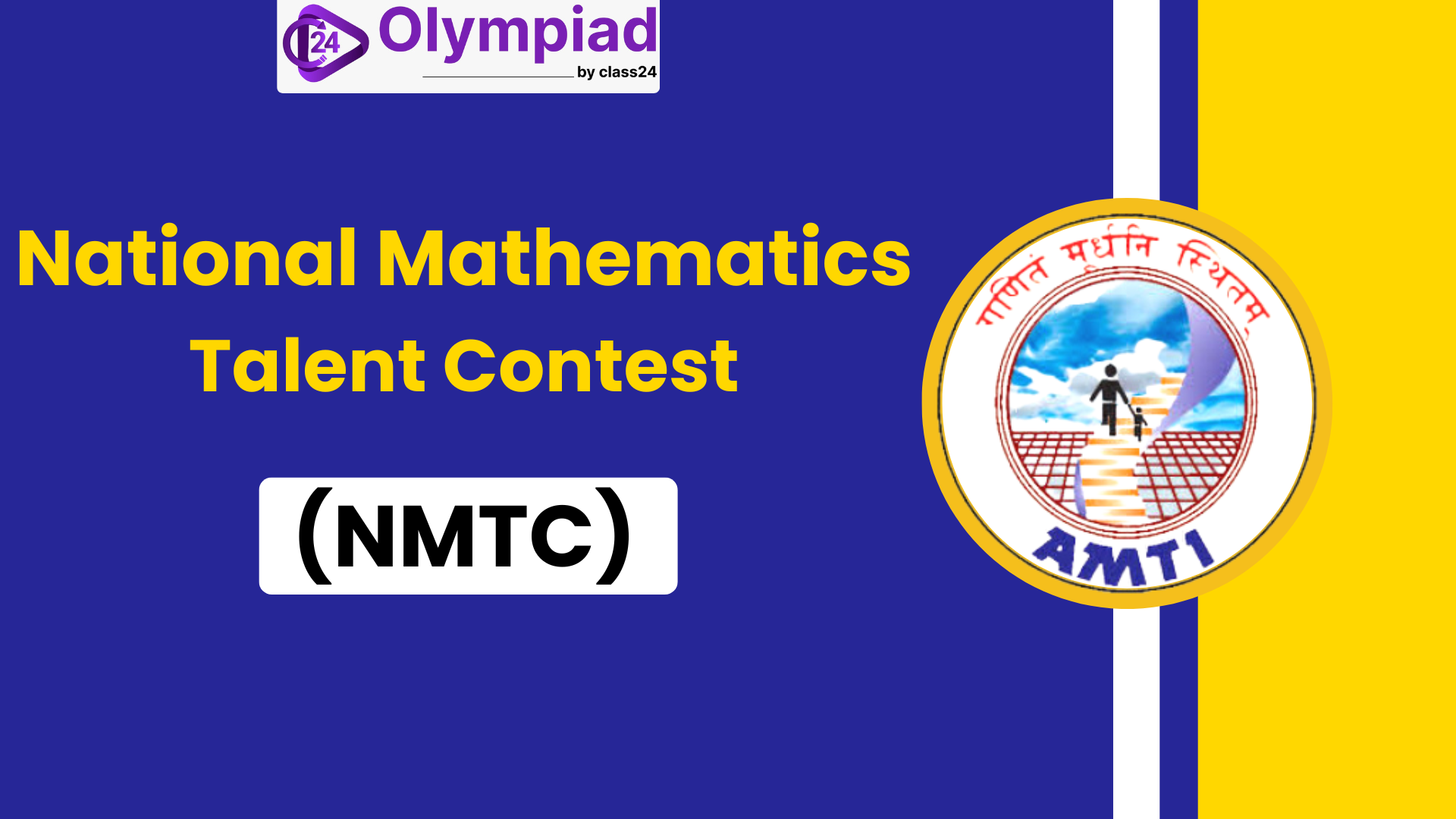
The National Mathematics Talent Contest (NMTC) 2025 is one of India’s most prestigious mathematics Olympiads, organized every year by the Association of Mathematics Teachers of India (AMTI). NMTC is known for challenging and non-routine problems and has nurtured young mathematical minds since 1968. This exam provides an opportunity to students from class 5 to graduation level to showcase their creativity, problem solving ability and reasoning ability at the national level. With a structure consisting of preliminary and final stages, NMTC 2025 will recognize students who are able to think beyond the textbook and solve mathematics problems in innovative ways.
The NMTC 2025 registration deadline has been extended to 15th July 2025 for all categories through institutions only. The Phase 1 preliminary exam will be held on August 23, 2025 (Saturday) between 10:00 AM to 12:00 PM and the preliminary result will be declared on September 4, 2025. Eligibility Qualified students, as well as participating senior students, will appear in the Stage 2 final examination scheduled on 25th October 2025 (Saturday) between 10:00 AM to 1:00 PM and the final result will be declared in the first week of December 2025. These official dates play a vital role in the preparation of students to participate in the National Mathematical Talent Competition 2025 as they let them know the complete schedule of the exam from registration to result.
Prepare your NMTC 2025 Now with our Free previous years question papers. The stated PYQs have been selectively prepared based on real NMTC examinations to have real-life perception of the nature of questions and their grade. I belong to the Primary category or the Sub-Junior category and this is one thing I know by heart now and it is to practice past year papers, one of the best things to do to make your accuracy and speed faster.
Boost your NMTC preparation
Understand question pattern & difficulty level
Perfect for self-assessment and daily practice
Download Free NMTC PYQs (PDFs)
| Year / Category | Download Link |
|---|---|
| 2019 NMTC PYQ – Primary Level | 📥 Download PDF |
| NMTC Topic-wise PYQ – Primary (Class 5 & 6) | Download PDF |
| NMTC Free PYQ – Sub-Junior Group (Class 7 & 8) | Download PDF |
Note: More free resources and mock tests are coming soon. Stay connected with Olympiad by Class24 for updates.
National Mathematics Talent Contest (NMTC) Olympiad is an Annual Competition held by the Association of Mathematics Teachers of India (AMTI) which since 1968 has been fostering mathematical flair. It is a competition that challenges students nationwide to express their imagination and their skills of solving problems in mathematics. It aims at young minds who are superior in thinking in terms of mathematics and are interested in solving complex and unfamiliar problems. The Mathematics Competition India has been termed with a rewarding yet challenging format, which makes people think outside the box. The NMTC 2025 registration process, NMTC exam 2025 syllabus particulars, and eligibility have been described so as to take students through the process. Students who join will get a chance to be rewarded and be part of an organization where they can engage with others who have the same interests as them and knowledge in math.
| Aspect | Details |
|---|---|
| Exam Name | National Mathematics Talent Contest (NMTC) Olympiad 2025 |
| Conducting Body | Association of Mathematics Teachers of India (AMTI) |
| Mode of Exam | Online (Preliminary Test); Offline (Final Test) |
| Medium of Exam | English |
| Eligibility Levels | - Primary (Class 5–6) - Sub-Junior (Class 7–8) - Junior (Class 9–10) - Inter (Class 11–12) - Senior (Degree Level) |
| Registration Deadline | Old Date |
| Stage - 1 Preliminary Test Date | 23rd August 2025 (Saturday), 10:00 AM – 12:00 PM |
| Stage - 2 Final Test Date | 25th October 2025 (Saturday), 10:00 AM – 1:00 PM |
| Duration | - Preliminary Test: 2 hours - Final Test: 3 hours |
| Type of Questions | - Preliminary Test: Multiple Choice Questions (MCQs) and Fill-in-the-Blank - Final Test: Subjective (Detailed Problem Solving) |
| Negative Marking | - Objective Questions: 0.5 marks deducted for incorrect answers - Numerical-based Questions: 0.25 marks deducted for incorrect answers |
| Selection Criteria | The top 10% of candidates in the Preliminary Test advance to the Final Test |
| Registration Link | amtionline.com |
NMTC 2025 registration is currently open. The last date was on 1st July 2025, they extended it to 15th July 2025 to join The National Mathematics Talent Contest (NMTC) organized by the Association of Mathematics Teachers of India (AMTI). No personal registrations will be received. Registration will only be in institutions. There are two rounds in the NMTC 2025, including a Preliminary Round and the Final Round. The Preliminary Round will start on 23rd August 2025, and the Final Round on 25th October 2025. The application deadline to contest is extended till 15th July 2025. Students will be required to go through the registration procedure in their respective institutions by the deadline. Here are some important NMTC 2025 exam dates:
| Event | Date |
|---|---|
| Name of Event | National Mathematics Talent Contest (NMTC) 2025 |
| Last Date of Registration | Old Date |
| Stage 1 Preliminary Exam Date | 23rd August 2025 (Saturday), 10:00 AM – 12:00 PM |
| Stage 1 Results Announcement | 4th September 2025 |
| Stage 2 Final Test Exam Date | 25th October 2025 (Saturday) 10 a.m. to 1 p.m. |
| Dispatch of Answer Books to AMTI | same day on 25th Oct 2025 (Speed Post or courier) |
| NMTC Stage 2 Results Announcement | The first week of December 2025 |
The process of applying to the NMTC (National Mathematics Talent Contest) is the entry into one of the most impactful math challenges in India, the careful development of which determines the talent and mathematical achievement among students. The NMTC 2025 registration requires complex filled forms, school-based checks, and all zonal coordination; this task requires accuracy and proper time management. It is an occasion, much anticipated by thousands of students nationwide and followed by them as a step to national mathematical appreciation. The seats are few and the competition is rising therefore getting a place in NMTC is a pride and a matter of academic prestige.
The candidates are required to go through a step-by-step process of registering to the National Mathematics Talent Contest (NMTC) 2025:
Note: It is important to note that the applications are not taken on an individual basis but institutions will be required to submit applications. The final NMTC 2025 registration date is July, 1, 2025. Make sure that everything is filled in to be ineligible.
NMTC Eligibility Criteria 2025 are grade-level-based. Students between Class 5 and undergraduate are allowed to participate in the contest. Participants of the primary level should be in Class 5 and Class 6 only whereas other levels such as the degree courses whose participants will be at the senior level will be available to Classes 7 to 12. Candidates who have an interest are supposed to enroll using their respective institutions but within the stipulated time. Here are some eligibility for NMTC exam 2025 are as follows:
| Category | Contest Name | Eligible Classes |
|---|---|---|
| Primary | Gauss Contest | 5th and 6th |
| Sub-Junior | Kaprekar Contest | 7th and 8th |
| Junior | Bhaskara Contest | 9th and 10th |
| Inter | Ramanujan Contest | 11th and 12th |
| Senior | Aryabhata Contest | Students studying degree courses in arts, science, and technical institutions |
Note: Senior-level courses are designed for students in college studying for a Bachelor’s degree in mathematics or a similar area.
All participants must currently be students in a school or college to take part. Students from any board can apply for this course.
The NMTC 2025 is a two-tier test the admission test and the final test. The first test is 2-hourly composed of objective questions and emphasizes problem-solving expertise, where the top 10% of those who get it, will qualify to the final. The seniors go straight into the final exam as they skip the preliminary round and sit the final exam, which is a subjective 3-hour exam with advanced mathematical content. The tests take place on specific schedules adhered to by AMTI and the schools do the preliminary testing followed by final testing by AMTI.
| Stage | Eligibility | Duration | Format | Key Notes |
|---|---|---|---|---|
| Preliminary Test | All except senior students | 2 hours | MCQs, Fill-in-the-blanks | Top 10% advance to Final Test Certificate = Hall Ticket |
| Final Test | Passes from Preliminary + Senior Level | 3 hours | Subjective questions | Evaluated by AMTI Top 10% move to Final |
| Senior Level | Degree-level students | 3 hours | Subjective questions | No Preliminary Test for senior students |
Stage 1: Prelims
This 2-hour objective test, consisting of multiple-choice and fill-in-the-blank questions is a preliminary test to all candidates but seniors. The test evaluates the problem-solving skills, with a combination of moderate (20% and difficult (80% questions. It takes place at schools and the best 10% of them proceed to the final round. Candidates who will be tested in the prelims will be issued with certificates that would also be used as the Hall Ticket in the final test.
Stage 2: Final Exam
This subjective test lasts 3 hours and only the qualified individuals in the preliminary exam are able to take it because it requires advanced mathematical issues and the exam is taken at the respective institutions. The last exam is focused on more mathematical knowledge and problem-solving.
Key Points:
The NMTC 2025 syllabus is the most important possession to achieve an efficient outcome. It assists the candidates in keeping the attention at the right topic and gives them an idea about the format of the exam. Students may organize their study times and make effective use of time by becoming acquainted with the Nmtc exam syllabus 2025. This eliminates anxiety as well because the type of questions that they will encounter are defined. Being conversant with the new syllabus helps to provide a proper preparation of the examination in the initial and final phases of the tests.
| Level | Contest Name | Key Topics |
|---|---|---|
| Primary | Gauss Contest | Arithmetic (fractions, percentages, ratio), Mensuration (triangles, circles), Algebra, Geometry |
| Sub-Junior | Kaprekar Contest | Arithmetic (square roots, time & work), Mensuration (3D shapes), Algebra, Geometry, Number Theory |
| Junior | Bhaskara Contest | Algebra (quadratic equations, logarithms), Geometry (circle theorems), Number Theory, Combinatorics |
| Intermediate | Ramanujan Contest | Algebra (polynomials, inequalities), Geometry (trigonometry, vectors), Number Theory, Combinatorics |
| Senior | Aryabhata Contest | Syllabus based on B.Sc. Mathematics (advanced algebra, geometry, number theory) |
Participating in the National Mathematics Talent Contest involves students in working with different and challenging areas of math. Our Olympiad By Class24 site helps you study by breaking down the NMTC syllabus for each class. This Nmtc exam 2025 syllabus is put together deliberately to promote critical thinking, clear reasoning, and the understanding of ideas.
| Level | Contest Name | Topics Covered |
|---|---|---|
| PRIMARY (Classes V & VI) |
Gauss Contest | Arithmetic: Fractions, percentages, profit & loss, divisibility, LCM, HCF, ratio & proportion, calendar |
| Mensuration: Triangles, quadrilaterals, circles | ||
| Algebra: Basic algebra (addition, subtraction, multiplication of expressions) | ||
| Geometry: Straight lines, parallel lines, angles in triangles, quadrilaterals, polygons | ||
| SUB JUNIOR (Classes VII & VIII) |
Kaprekar Contest | Arithmetic: Square roots, cube roots, average, time & work, time & distance, races, traveling around a circle |
| Mensuration: 3D shapes (cubes, cuboids, spheres, cones, cylinders, pyramids) | ||
| Algebra: Linear & quadratic equations, identities, surds, factorization | ||
| Geometry: Triangle inequalities, parallelograms, trapezoids, Pythagoras’ theorem | ||
| Number Theory: Prime & composite numbers, divisibility | ||
| JUNIOR (Classes IX & X) |
Bhaskara Contest | Algebra: Quadratic equations, logarithms, remainder theorem, sequences & series, inequalities, mathematical induction |
| Geometry: Circle theorems, chords, arcs, angles, cyclic quadrilaterals, tangents, Apollonius theorem | ||
| Number Theory: Modular arithmetic, Greatest Integer Function, Least Integer Function | ||
| Combinatorics: Permutations, combinations, Pigeonhole principle, Inclusion-Exclusion principle | ||
| INTERMEDIATE (Classes XI & XII) |
Ramanujan Contest | Algebra: Polynomials, inequalities, functional equations |
| Geometry: Trigonometry, vectors, coordinate geometry, complex numbers | ||
| Number Theory: Fermat & Wilson's theorems, Diophantine equations | ||
| Combinatorics: Counting techniques, recurrence relations | ||
| SENIOR (College Level) |
Aryabhata Contest | Syllabus: B.Sc. Mathematics course content (subjective questions) |
| Topics: Advanced topics in Algebra, Geometry, Number Theory, and Combinatorics from undergraduate-level syllabus |
At Olympiad By Class24, we know that doing well in NMTC isn’t just about knowing the concepts, however, you also need to practice in the right way and clearly understand what is being taught. If you are aiming for Non-routine Maths Olympiad preparation our carefully chosen study materials and practice problems match what is in the NMTC syllabus 2025 so students can better understand the subjects and get ready for the test.
These are some of the special features that set Class24 above all the other exams in NMTC preparation:
Stay tuned for our new module courses, sample test papers, and live group help sessions, all made especially for different levels of NMTC.
The involvement with the NMTC is an activity that makes students improve their problem-solving skills and master mathematics better. It gives an opportunity to compete with the best young minds and develops creativity and critical thinking. The NMTC can also enhance academic confidence and create a path to acquire future scholarships and opportunities as well. It also instills a passion towards mathematics to train students so that when they grow they are ready to face higher-level examinations and competitions. Here are some NMTC exam benefits:
Exposure to Competitive Mathematics: Students get to see how hard it can be to compete and at the same time improve their math skills.
Enhancement of Problem-Solving Abilities: The unique questions help people think more carefully and come up with new ideas.
Academic Growth: Participation helps students understand ideas better, which can make studying for big tests and exams a little easier.
Scholarships and Opportunities: High scorers can qualify for scholarships and get an opportunity to join special advanced contests.
Confidence Building: Facing tough issues helps you get more confident in yourself and makes it easier to keep going with your schoolwork.
Networking: Participants get to meet other people who have the same interests as them, hang out with helpful mentors, and talk to experts.
In order to become fully prepared to NMTC 2025, one should introduce the proper study of the NMTC 2025 syllabus and sheer practice of essential mathematical concepts. One should practice frequently by taking simulated tests in which new skills of perfecting a problem and time management can be attained. Develop analytical thinking, paying more attention to learning basic concepts and trying to solve tricky issues. Regular training, the advice of experts and online tools will assure you in confidence and performance during the pre-selections and the final kiss of fortune. Here are some preparation tips for NMTC Exam 2025:
Understand the Syllabus Thoroughly
Study the NMTC exam syllabus and pick out areas where your essential knowledge could use improvement.
Practice Past Year's Papers
Using Non-routine Maths question papers from previous years is useful for understanding the type and level of questions in the exam.
Develop Problem-Solving Skills
Do brain teasers and Olympiad-style exercises to help build your creative and logical skills.
Join Coaching or Study Groups
Getting help from peers or mentors can teach you a lot and keep you motivated.
Manage Time Effectively
Try to complete all Non-standard Maths Olympiad questions in the given amount of time when you take the test.
Use Reference Books and Resources
Check the internet and Olympiad books for many different problem types.
The National Mathematics Talent Contest is a wonderful opportunity for young people who enjoy math to work on their skills and progress academically. Hosted by the Association of Mathematics Teachers of India (AMTI), the event is well respected for excellence and advancements in Indian mathematics.
As students experience NMTC, they get acknowledged, build their ability to think critically and work on problems, and grow to like the subject more. All those who wish to compete in 2025 should get ready, join the event confidently, and enjoy the pleasure of mathematics. Grow your skills, challenge your mind, and join the group of India’s future math superstars with NMTC!
Download the official NMTC Test Papers & Previous Year Questions (PYQs) to strengthen your mathematical reasoning and problem-solving ability. These PDFs include both Mock Tests and Stage-1 PYQs for Primary, Sub-Junior, and Junior Levels.
Primary Level (Classes 5–6)
| Paper Name | Download PDF |
|---|---|
| NMTC Primary Test 1 | Download PDF |
| NMTC Primary Test 2 | Download PDF |
| NMTC 2016 Stage 1 PYQ – Primary Level | Download PDF |
| NMTC 2019 Stage 1 PYQ – Primary Level | Download PDF |
| Paper Name | Download PDF |
|---|---|
| Sub-Junior NMTC Test 1 | Download PDF |
| Sub-Junior NMTC Test 2 | Download PDF |
| NMTC 2016 Stage 1 PYQ – Sub-Junior Level | Download PDF |
| NMTC 2017 Stage 1 PYQ – Sub-Junior Level | Download PDF |
| Paper Name | Download PDF |
|---|---|
| NMTC Mock Test 1 – Junior Level | Download PDF |
| NMTC Mock Test 2 – Junior Level | Download PDF |
| NMTC 2017 Stage 1 PYQ – Junior Level | Download PDF |
| NMTC 2019 Stage 1 PYQ – Junior Level | Download PDF |
Class 6 - NMTC Primary
Class 7th & 8th - NMTC Sub Junior
Class 9th & 10th - NMTC Junior




Leave a Comment